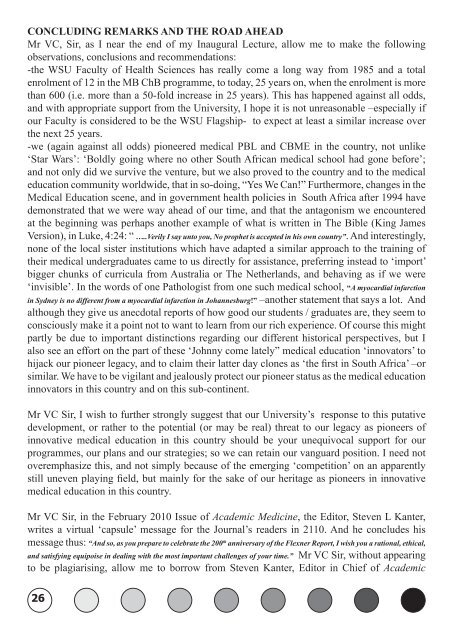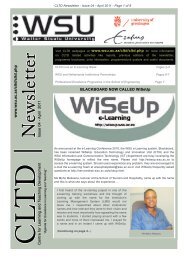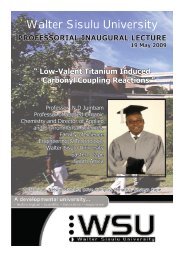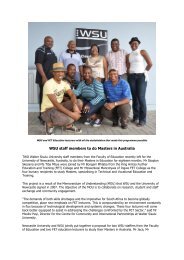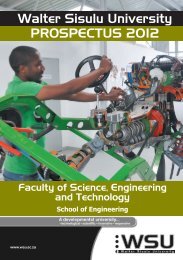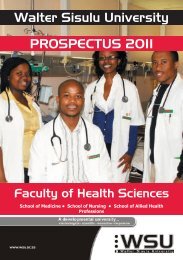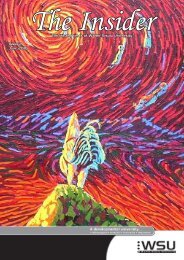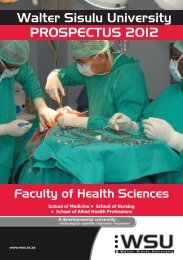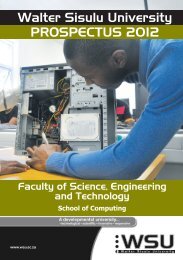25 years of training doctors at WSU: how - Walter Sisulu University
25 years of training doctors at WSU: how - Walter Sisulu University
25 years of training doctors at WSU: how - Walter Sisulu University
Create successful ePaper yourself
Turn your PDF publications into a flip-book with our unique Google optimized e-Paper software.
COnCLUDInG REMaRKS anD THE ROaD aHEaD<br />
Mr VC, Sir, as I near the end <strong>of</strong> my Inaugural Lecture, allow me to make the following<br />
observ<strong>at</strong>ions, conclusions and recommend<strong>at</strong>ions:<br />
-the <strong>WSU</strong> Faculty <strong>of</strong> Health Sciences has really come a long way from 1985 and a total<br />
enrolment <strong>of</strong> 12 in the MB ChB programme, to today, <strong>25</strong> <strong>years</strong> on, when the enrolment is more<br />
than 600 (i.e. more than a 50-fold increase in <strong>25</strong> <strong>years</strong>). This has happened against all odds,<br />
and with appropri<strong>at</strong>e support from the <strong>University</strong>, I hope it is not unreasonable –especially if<br />
our Faculty is considered to be the <strong>WSU</strong> Flagship- to expect <strong>at</strong> least a similar increase over<br />
the next <strong>25</strong> <strong>years</strong>.<br />
-we (again against all odds) pioneered medical PBL and CBME in the country, not unlike<br />
‘Star Wars’: ‘Boldly going where no other South African medical school had gone before’;<br />
and not only did we survive the venture, but we also proved to the country and to the medical<br />
educ<strong>at</strong>ion community worldwide, th<strong>at</strong> in so-doing, “Yes We Can!” Furthermore, changes in the<br />
Medical Educ<strong>at</strong>ion scene, and in government health policies in South Africa after 1994 have<br />
demonstr<strong>at</strong>ed th<strong>at</strong> we were way ahead <strong>of</strong> our time, and th<strong>at</strong> the antagonism we encountered<br />
<strong>at</strong> the beginning was perhaps another example <strong>of</strong> wh<strong>at</strong> is written in The Bible (King James<br />
Version), in Luke, 4:24: “ …..Verily I say unto you, No prophet is accepted in his own country”. And interestingly,<br />
none <strong>of</strong> the local sister institutions which have adapted a similar approach to the <strong>training</strong> <strong>of</strong><br />
their medical undergradu<strong>at</strong>es came to us directly for assistance, preferring instead to ‘import’<br />
bigger chunks <strong>of</strong> curricula from Australia or The Netherlands, and behaving as if we were<br />
‘invisible’. In the words <strong>of</strong> one P<strong>at</strong>hologist from one such medical school, “A myocardial infarction<br />
in Sydney is no different from a myocardial infarction in Johannesburg!” –another st<strong>at</strong>ement th<strong>at</strong> says a lot. And<br />
although they give us anecdotal reports <strong>of</strong> <strong>how</strong> good our students / gradu<strong>at</strong>es are, they seem to<br />
consciously make it a point not to want to learn from our rich experience. Of course this might<br />
partly be due to important distinctions regarding our different historical perspectives, but I<br />
also see an effort on the part <strong>of</strong> these ‘Johnny come l<strong>at</strong>ely” medical educ<strong>at</strong>ion ‘innov<strong>at</strong>ors’ to<br />
hijack our pioneer legacy, and to claim their l<strong>at</strong>ter day clones as ‘the first in South Africa’ –or<br />
similar. We have to be vigilant and jealously protect our pioneer st<strong>at</strong>us as the medical educ<strong>at</strong>ion<br />
innov<strong>at</strong>ors in this country and on this sub-continent.<br />
Mr VC Sir, I wish to further strongly suggest th<strong>at</strong> our <strong>University</strong>’s response to this put<strong>at</strong>ive<br />
development, or r<strong>at</strong>her to the potential (or may be real) thre<strong>at</strong> to our legacy as pioneers <strong>of</strong><br />
innov<strong>at</strong>ive medical educ<strong>at</strong>ion in this country should be your unequivocal support for our<br />
programmes, our plans and our str<strong>at</strong>egies; so we can retain our vanguard position. I need not<br />
overemphasize this, and not simply because <strong>of</strong> the emerging ‘competition’ on an apparently<br />
still uneven playing field, but mainly for the sake <strong>of</strong> our heritage as pioneers in innov<strong>at</strong>ive<br />
medical educ<strong>at</strong>ion in this country.<br />
Mr VC Sir, in the February 2010 Issue <strong>of</strong> Academic Medicine, the Editor, Steven L Kanter,<br />
writes a virtual ‘capsule’ message for the Journal’s readers in 2110. And he concludes his<br />
message thus: “And so, as you prepare to celebr<strong>at</strong>e the 200 th anniversary <strong>of</strong> the Flexner Report, I wish you a r<strong>at</strong>ional, ethical,<br />
and s<strong>at</strong>isfying equipoise in dealing with the most important challenges <strong>of</strong> your time.” Mr VC Sir, without appearing<br />
to be plagiarising, allow me to borrow from Steven Kanter, Editor in Chief <strong>of</strong> Academic<br />
26


